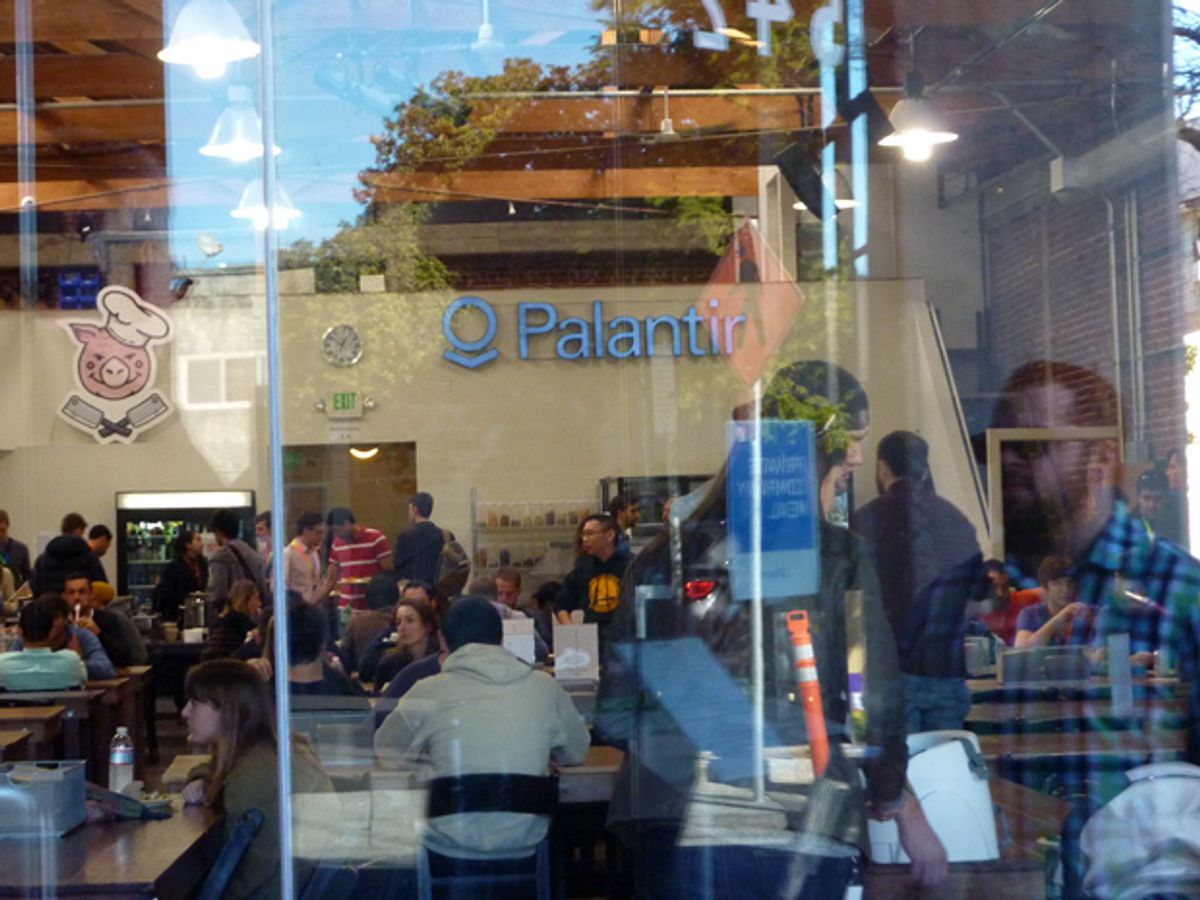Walk around downtown Palo Alto these days and you’ll spot a number of prime office buildings with frosted or shaded windows and no signs on their doors. Stealth startups? Hardly. Odds are you’re looking at real estate leased by data analysis pioneer Palantir.

Palantir was founded in 2004 by a team that includes PayPal cofounder Peter Thiel with a plan to “reduce terrorism while preserving civil liberties” using technology similar to that developed at PayPal for antifraud efforts. The CIA was both an early investor and an early customer, and Thiel himself over the years invested some $30 million in the venture. Palantir continues to feed services and technology to U.S. national security agencies, but now also does work for state and local governments and corporations. It’s big and getting bigger, with a reported 1200 employees in 2013 at some nine locations around the world, including McLean, Va. (of course), Abu Dhabi, Tel Aviv, Asia, Australia, and New Zealand. And it’s still hiring.
Palantir is worth a lot: it was officially valued at $9 billion in 2013, and a recent funding round reportedly bumped that up to over $11 billion; but there are questions whether such a company could survive going public and the disclosures and pressures that would involve.

Palantir’s software acts as a natural language interface to sets of data and allows users to connect different types of data sets to better understand relationships. Palantir’s web site advertises that it can help people in healthcare, finance, disaster preparedness, cybersecurity, and other areas. It gives a few examples of what people have done with its tools—like uncover the GhostNet network of infected computers and spot shipments of elephant ivory. And last year the New York Times reported on a few more projects—like helping Hershey increase chocolate profits and JPMorgan Chase to sell foreclosed homes.
But generally, Palantir doesn’t talk much (the software was rumored to have pinpointed Osama bin Laden’s location, but that report has never been confirmed). That’s why the news site TechCrunch got a lot of attention this week when it reported that it had gotten its hands on an investment prospectus that featured success stories of organizations using Palantir’s tools, even though the revelations were less than earthshattering. Palantir’s software, as reported by TechCrunch, has been used by:
- the Securities Investment Protection Corporation to nail Bernie Madoff by sorting through 40 years of records
- the Los Angeles Police Department to support “cops on the street and the officers doing the investigations”
- the Centers for Medicate and Medicare services to identify potentially fraudulent medical providers
- the Pentagon to track roadside bomb deployment—and to discover that garage-door openers were being used as detonators
- the CIA and FBI to connect their databases
- the International Consortium of Investigative Journalists to look into trafficking of human tissue

Some say this recent leak was a blatant publicity attempt by Palantir as it seeks additional investors. If so, it worked; if not, it’s no disaster for the organization, and none of the information released compromises current efforts. It did turn attention to a company that has, for the most part, has been avoiding the spotlight, except when it does good for the community, like its recent effort to teach low-income high school students how to code or when employees complain about the lack of housing near their downtown Palo Alto offices.
We probably should be paying more attention to Palantir. The Internet of Things is quickly increasing the amount of data about our lives that is available, and it would nice to know what might be done with it—and who might be doing it—before the cloud knows about every breath we take. The interest in this “leak” demonstrates that it’s time for Palantir to get out from behind that frosted glass. Or at least put signs on its doors, because it would be nice to know if downtown Palo Alto really has become a Palantir campus.
Update 22 January: Another application of Palantir’s technology emerges—ferreting out illegal Airbnb rentals. This ironically pits one of Thiel’s investments against another.
Tekla S. Perry is a senior editor at IEEE Spectrum. Based in Palo Alto, Calif., she's been covering the people, companies, and technology that make Silicon Valley a special place for more than 40 years. An IEEE member, she holds a bachelor's degree in journalism from Michigan State University.



